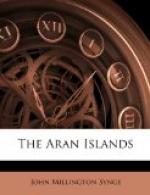The language seems to be identical, though some of these men speak rather more distinctly than any Irish speakers I have yet heard. In physical type, dress, and general character, however, there seems to be a considerable difference. The people on this island are more advanced than their neighbours, and the families here are gradually forming into different ranks, made up of the well-to-do, the struggling, and the quite poor and thriftless. These distinctions are present in the middle island also, but over there they have had no effect on the people, among whom there is still absolute equality.
A little later the steamer came in sight and lay to in the offing. While the curaghs were being put out I noticed in the crowd several men of the ragged, humorous type that was once thought to represent the real peasant of Ireland. Rain was now falling heavily, and as we looked out through the fog there was something nearly appalling in the shrieks of laughter kept up by one of these individuals, a man of extraordinary ugliness and wit.
At last he moved off toward the houses, wiping his eyes with the tail of his coat and moaning to himself ‘Ta me marbh,’ (’I’m killed’), till some one stopped him and he began again pouring out a medley of rude puns and jokes that meant more than they said.
There is quaint humour, and sometimes wild humour, on the middle island, but never this half-sensual ecstasy of laughter. Perhaps a man must have a sense of intimate misery, not known there, before he can set himself to jeer and mock at the world. These strange men with receding foreheads, high cheekbones, and ungovernable eyes seem to represent some old type found on these few acres at the extreme border of Europe, where it is only in wild jests and laughter that they can express their loneliness and desolation.
The mode of reciting ballads in this island is singularly harsh. I fell in with a curious man to-day beyond the east village, and we wandered out on the rocks towards the sea. A wintry shower came on while we were together, and we crouched down in the bracken, under a loose wall. When we had gone through the usual topics he asked me if I was fond of songs, and began singing to show what he could do.
The music was much like what I have heard before on the islands—a monotonous chant with pauses on the high and low notes to mark the rhythm; but the harsh nasal tone in which he sang was almost intolerable. His performance reminded me in general effect of a chant I once heard from a party of Orientals I was travelling with in a third-class carriage from Paris to Dieppe, but the islander ran his voice over a much wider range.




